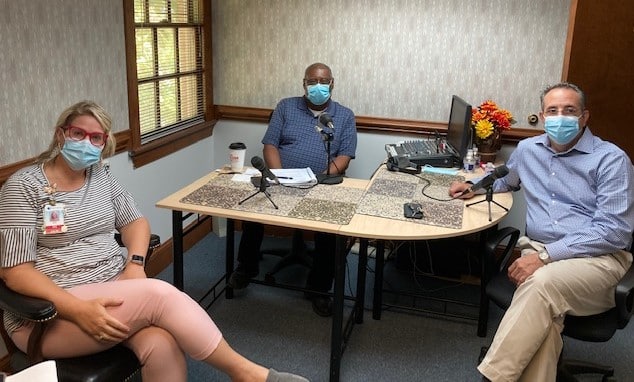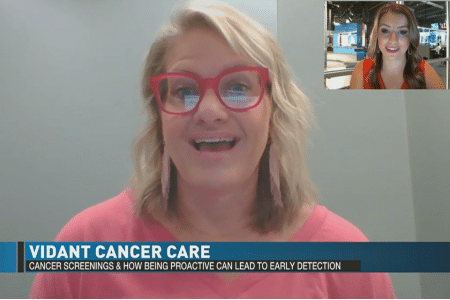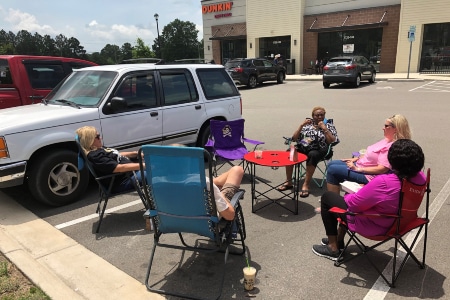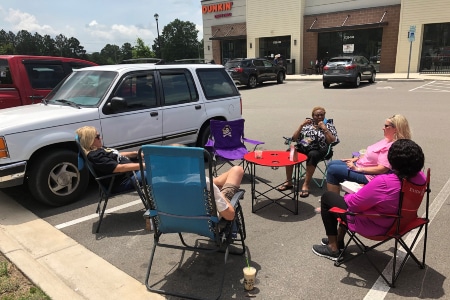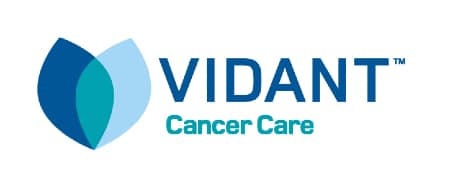One of the most important actions to take to preserve your health is to know your risks and to get a lung cancer screening if recommended by your health care provider. The only recommended screening test for lung cancer is low-dose computed tomography, also called a low-dose CT scan or LDCT.
Dr. Mark Bowling, chief of pulmonary & critical care, and director of thoracic oncology program at ECU and ECU Health Medical Center, said, “Early identification is key and right now the best chance for a cure is early detection and surgical resection. Early-stage lung cancer may not remain early for long, so take action now.”
There are ways to reduce risk for lung cancer that should serve as a checklist to anyone concerned about their health. One of the primary causes of lung cancer is smoking and vaping. Quitting smoking makes a positive impact on lung health. Avoiding secondhand smoke is another factor in reducing lung cancer risks. It is important to have your home or residence tested for radon. This odorless gas is the second leading cause of lung cancer in smokers and the leading cause of lung cancer in non-smokers. Finally, lower exposure to cancer-causing substances at work or in the home. These substances include asbestos, arsenic, nickel and chromium.
Advances in the therapies for lung cancer are encouraging. “Treatments for lung cancer, despite the stage, are advancing at an incredible pace,” Dr. Bowling said. “Hope and optimism for not only long-term control of the disease, but for a cure is in the realm of possibility.”
For more information about the risks and prevention of lung cancer, or if you do not have a primary care provider, please contact the Prevention Clinic at ECU Health Cancer Care (252) 816-RISK (7475)
“The fear of regularly-scheduled health screenings in the time of this pandemic is making a huge impact on early diagnosis, when it is easier to treat cancer,” said Nikki Hyatt, ECU Health Cancer Care outreach coordinator.
Dr. Emmanuel Zervos, surgical oncologist for ECU Brody School of Medicine and Vidant, and executive director of ECU Health Cancer Care, echoed those sentiments, noting that early detection leads to improved outcomes.
“Monitoring patients at risk for certain cancers or who meet recommended age criteria is the key to the early detection. Cancer screening is the best way to detect cancer before symptoms arise,” Dr. Zervos said. “The easiest cancer to treat is the one that never happens. The later we diagnose a cancer, the more limited and less effective treatment options become.”
Screening is recommended as early as age 30 for some cancers, especially in higher risk patients as part of their regular health routine. The American Cancer Society is now recommending PSA testing beginning as early as age 40 for high risk patients like African-American males with strong family histories of prostate cancer.
For breast cancer, mammography screening should begin at age 40 for normal risk patients and 30 for patients with known genetic mutations or syndromes or a history of radiation treatment to their chest between the ages of 10 and 30.
Dr. Zervos shared that anytime you are experiencing symptoms before the recommended age of screening, you should consult your primary care physician. Certain risk factors including race, family history, smoking tobacco and drinking alcohol all factor in to the need to initiate cancer screenings.
For those concerned about their risk for cancer, the Vidant Cancer Prevention Clinic is open and offers information about cancer prevention as well as treatment resources. For more information about the programs and resources at ECU Health Cancer Care, please call 816-RISK (7475).
From February to April, routine cancer screenings dropped 90 percent due to the COVID-19 pandemic, but cancer is not going away. Read more »
Typically, these conversations and meetings would come at various ECU Health Cancer Care events but since the onset of COVID-19, in-person group gatherings have been put on hold.
Dale Naylor, a breast cancer survivor, said after the last meeting at ECU Health Medical Center in early March, she made it about a month before she had to get out and see what she calls “her family” in the survivorship group. The group has set up in front of FreshVibes once a week since early April to get together and enjoy each other’s company while practicing social distancing.
“It started with two pickup trucks, we were sitting on the tailgates,” Naylor said. “The next week when we came, we sat out in a parking space and put some chairs out and we’ve been doing it ever since the first week of April.”
The group has been finding some sense of normalcy in these get-togethers and sharing in each other’s journey is helping everyone through a challenging time.
Naylor said the best part about the group is how close they have become and their openness and honesty with one another.
“It’s wonderful because not only have we experienced similar journeys, but we’ve grown into a very cohesive group. It’s like missing part of your family,” Naylor said. “This has pretty much helped all of us stay sane, so to speak.”
Along with these weekly informal meet ups, the group has been meeting with Jenny Higgins, a psychosocial support and survivorship coordinator with Vidant Health, via video conferences for different classes each week.
“Right now, we’re doing everything via (video calls), we do knitting together, journaling, art class and now we’re doing yoga. It’s good to have some kind of normalcy,” said Charlotte Forjoe, a breast cancer survivor.
Forjoe said she received her care at Vidant and the patient-centered approach, from the attitude of valet service to the personal touch of the doctors, made all the difference. The services available through the survivorship program have been crucial for Forjoe.
“These classes that are free to us, it was a way for us to come together and we all had a common bond – and that was cancer,” Forjoe said. “Family is great, but people who have experienced it and that you can talk to and be open with, without judgement, that’s what you need sometimes.
“Even though I had family, I kind of gravitated more toward this group. They became my extended family and the family that I needed at that time to help me emotionally through it,” Forjoe said.
Like Naylor, Forjoe said the group has become an extension of her family and having the extra support system in place has helped her through her cancer journey.
She said she even makes a point to seek out patients at Vidant and in the community to tell them about the program and let them know of upcoming events.
“I’m that much of a believer in what Vidant offers and what they give to you as you’re going through that process,” Forjoe said.
For Forjoe, the survivorship group is about much more than surviving after a cancer diagnosis. She sees herself, and the other members of the survivorship group, taking advantage of a new outlook on life, and truly thriving.
“I’m a thriver. I’m going to live life,” Forjoe said. “To me, just surviving means you’re going through life, but I’m thriving, I’m going, and I’m not going to let cancer stop me or beat me. So I’m thriving – and we all are.”
A group of five cancer survivors met outside of FreshVibes on Arlington Boulevard in Greenville on an overcast Wednesday – just a few days after National Cancer Survivors Day earlier this year – to talk about their cancer journey, the latest happenings in the news and recent beach visits. Read more »
ECU Health Cancer Care is pleased to announce it now offers new, comprehensive cancer care services including hematology, medical oncology, radiation oncology, and surgery to residents of the greater Roanoke Valley area for treatment of solid tumors and hematological malignancies, as part of its integration with Vidant North Hospital. Dr. John Huffman, formerly of the Boice-Willis Clinic in Rocky Mount, will provide hematology and medical oncology services, which are new at Vidant North.
In addition to chemotherapy, Vidant North offers comprehensive cancer services and greater access to all necessary cancer care:
- Chemotherapy
- 3D Mammography
- Radiation Oncology
- Surgery
- CT
- MRI
- Gastroenterology
- Internal Medicine
- Endoscopy
- Emergency Medicine
- Ultrasound
- Primary Care
- Consultation
- Rapid Referrals
- Screenings
“This is an important day for Vidant North Hospital and the communities it serves,” said Dr. Vijay Chaudhary, director of regional oncology, ECU Health Cancer Care. “Providing high-quality, comprehensive cancer care close to home is an important part of how we meet our mission to improve the health and well-being of eastern North Carolina. I am pleased to welcome Dr. Huffman to the team.”
ECU Health Cancer Care’s cancer services offer greater access to those who call the valley home, including Roanoke Rapids, Enfield, Littleton, Rocky Mount, Scotland Neck and Warrenton. It is closely connected with other ECU Health Cancer Care resources, including the tertiary care team in Greenville.
“We’re excited to now offer the comprehensive cancer services of ECU Health Cancer Care, right here in the Roanoke Valley with the grand opening of our Cancer Care Center at Vidant North,” said Will Mahone, president, Vidant North. “Dr. Huffman brings decades of experience and expertise to our region and our entire cancer care team will deliver specialty care to the many patients seeking necessary cancer services in the area.”
Nurse Practitioner Elizabeth Inscoe has joined Dr. Huffman at Vidant North and existing patients of Dr. Huffman are welcome to transfer care to Vidant North and continue their treatment.
“I am thrilled to join the teams at ECU Health Cancer Care and Vidant North Hospital,” Dr. Huffman said. “This opportunity allows me to continue to serve the community in a meaningful way and to build upon the relationships I have with my patients and their loved ones. I look forward to continuing to serve and provide high-quality cancer care in this new role.”
Located in a freshly-renovated, convenient space on the second floor of Vidant North, ECU Health Cancer Care is available for medical oncology referrals, appointments, consults and other information. To learn more about these services, visit VidantCancerCare.com.
For medical referrals, appointments and consultations, call 252-535-8240.

